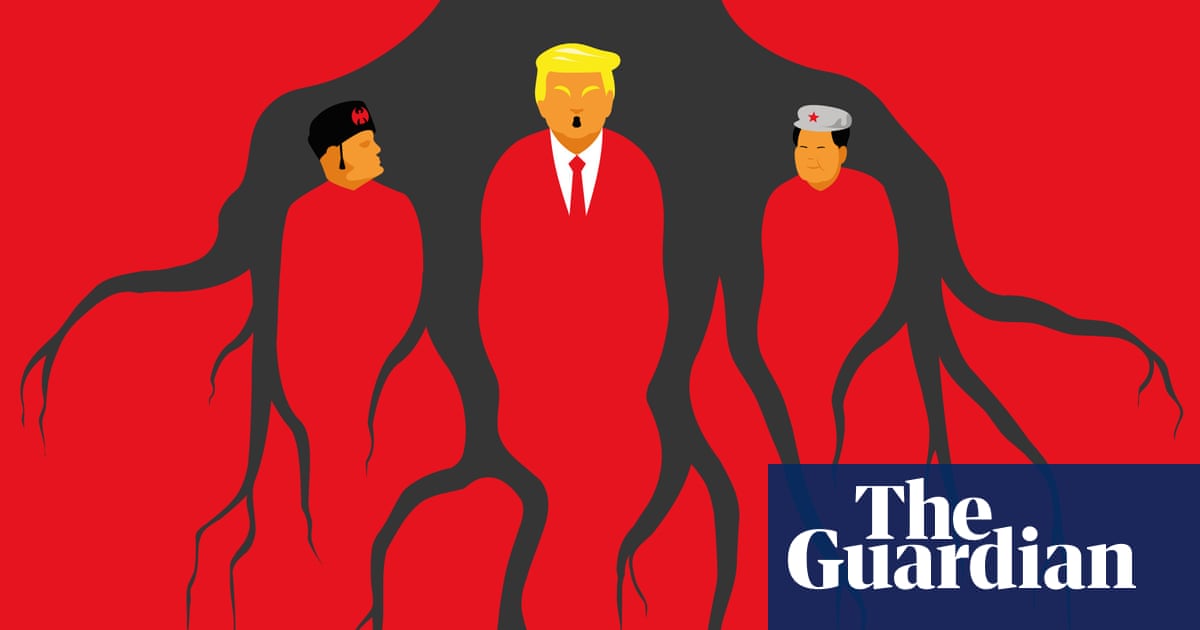A recent piece of research commissioned by Channel 4suggestedthat more than half of people aged between 13 and 27 would prefer the UK to be an authoritarian dictatorship.
The results shocked a lot of people concerned about the rising threat of autocracy across the world, including me. Yet, on reflection, I don’t think we should be surprised. The way we evolved predisposes us to place trust in those who often deserve it least – in a sense, hardwiring us to support the most machiavellian among us and to propel them into power. This seems like an intractable problem. But it’s what we do in the face of that knowledge that matters.
Recent work in anthropology and primatology shows how this wiring evolved. Our ancient ancestors, like most primates today, lived in groups dominated by violent and aggressive alpha males. Yet over the course of our biological and cultural evolution, unlike our primate cousins, we learned to work together to counter those bullyboys, organising to diminish their influence.
This is sometimes seen as a process ofself-domestication– a hypothesis with roots in the writings of Charles Darwin. Today, there’s strong evidence to support this view: not only do we cooperate to a broader extent than any known species, but even our faces – which are flatter and lack the prominent brow ridges associated with higher testosterone levels – suggest a reduced tendency towards aggression than that seen in our closest genetic relatives, such as chimpanzees.
There’s another set of features that researchers todayargueevolved as we started to cooperate more widely. They’re known as learning biases. Work in anthropology and psychology shows convincingly that humans tend to believe what others around them believe, especially those they see as successful. These are known as conformity and prestige biases respectively – and can have strong effects on how we perceive information. The psychologist Solomon Asch demonstrated this in some classic experimentalworkon visual judgment: when asked to compare lines on a piece of card, participants agreed that a short line was the same length as a longer one once they’d heard other people in the group say it was.
These biases probably evolved to help us coordinate more effectively, as we would have needed to in order to hunt big game, for example. This might explain why, in both preindustrial and modern societies, adolescents tend toemulatethe behaviour of the most athletic people, whether that athleticism is expressed in hunting or sports.
Yet those same biases, combined with our trusting natures, leave us vulnerable to exploitation by autocratic leaders. I believe that having mostly eliminated overt aggression, ancient societies ended up inadvertently improving the chances of individuals who were skilled at manipulating others in subtler ways. Some people call this traitproactive aggression, others,machiavellian intelligence, or the ability and inclination to dominate not with violence, but via social manoeuvring and deceit. We accidentally favoured, and continue to favour, those who pretend to cooperate until they don’t need to pretend any more – what you might call our “invisible rivals”.
Machiavellian people are particularly effective at using our biases against us. Influencers such as Andrew Tate, who featured as a popular source of information in the Channel 4 survey, are adept at using their success and popularity to sell their ideas to their followers, carefully avoiding any balancing viewpoints. And it’s the young, the impressionable and perhaps those most unhappy with themselves who are more likely to trust them.
Strongmen such asDonald Trumpwork in a similar way. They use deceit and manipulation to create total trust in their abilities, and then use that trust to propel themselves into positions of power – often then betraying the people that supported their bids, as Trump has done multiple times.
Today’s authoritarian leaders have not only these age-old tools at their disposal, but vast networks for deploying their information-based agendas. Trump’s recent attacks on the worlds of science and education, promoted on Truth Social, his own social media platform, and boosted by his acolyte Elon Musk, are a case in point. Despite the novel means of dissemination, such actions are just the latest sallies in a long history of wars over trust and belief. When the Bolsheviks took power in Russia, for example, they deemed certain areas of scientific study “bourgeois” and substituted them for ideologically acceptable ones.
Still, we can be optimistic that timeless problems are amenable to timeless solutions. Our ancestors found ways to balance the best elements of human nature against the worst – and in doing so to counter the influence of our inbuilt biases. The first step towards that is to recognise that we have a proclivity for blindly following others and trusting success, to share this insight and to support our fellow citizens’ capacity to think both critically and ethically.
Where we see authoritarians taking aim at knowledge-creating institutions – whether universities such as Harvard or bodies such as theNational Museum of African American History and Culturethat teach us about our past mistakes – we must move to protect them, both with our voices and our financial resources. Where we see brute power combined with ignorance, we can throw our support behind knowledge, peaceful protest and education.
Sign up toBookmarks
Discover new books and learn more about your favourite authors with our expert reviews, interviews and news stories. Literary delights delivered direct to you
after newsletter promotion
And finally, when reigns of terror end – and eventually, they always do – it is critical to learn and absorb the lessons. That way, we inoculate ourselves afresh against our natural tendency to trust the untrustworthy, carrying that wisdom forward into the future so that we’re better able to stymie the autocrats who seek to close our minds.
Jonathan R Goodman is a social scientist and the author ofInvisible Rivals (Yale).
Autocracy, Incby Anne Applebaum (Allen Lane, £20)
How Democracies Dieby Steven Levitsky and Daniel Ziblatt (£10.99, Penguin)
Wired for Cultureby Mark Pagel (Penguin, £25)
